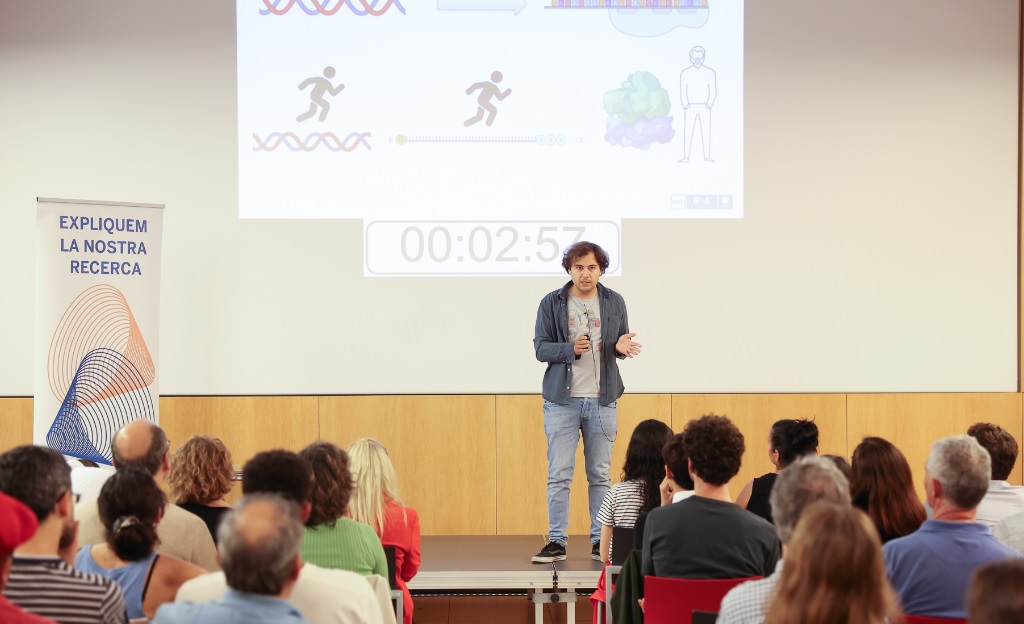Ivan Milenkovic’s ribosomes win the Rin4’ science outreach competition
Ivan Milenkovic’s ribosomes win the Rin4’ science outreach competition
As each year since 2015, the Rin4’ competition has been held, in which doctoral students outline their research in four minutes before a non-specialist public. Ivan Milenkovic, a doctoral student on the Biomedicines programme has won this year's edition and will represent UPF in the Catalan university finals organized by the Catalan Foundation for Research and Innovation.

What is a ribosome? How does marijuana affect the brain? How are the Latin Queens represented in the media? These subjects are the contents of future theses by UPF doctoral students who presented their research to a lay audience in just four minutes during the Rin4' (Research in Four Minutes) competition. Organized by the UPF Doctoral School, the initiative aims to boost the communication skills of doctoral students at the University to improve scientific dissemination.
The final of the seventh competition was held today, 24 May, in the multipurpose room of the Mercè Rodoreda building on the University’s Ciutadella campus. It kicked off at 3.30 pm and involved seven finalists on the doctoral programmes in Humanities, Biomedicine, Communication, Translation and Language Sciences, and Information and Communication Technologies.
What is a ribosome? How does marijuana affect the brain? How are the Latin Queens represented in the media?
“Two of the things I’ve learned here are Catalan and about ribosomes”, explains Ivan Milenkovic, a doctoral student in Biomedicine and winner of the first prize, endowed with 1,000 euros. His presentation “The dynamic life of ribosomes” focuses on the research carried out by the Centre for Genomic Regulation (CRG) on ribosomes, cellular organuls that account for 20% of the human body and, until relatively recently, studies presented as being static elements, uniform throughout the human body. However, Ivan’s research observes how these organules are not identical throughout the body and that, moreover, some of them may change due to physiological and pathalogical stimuli such as hypertrophy or heart attack. Thus, as he explains: “These four years of doctoral studies have proved that there remains a lot to learn about the micro-world and that, only by paying attention to the details will we be able to change the major paradigms”.
“These four years of doctoral studies have proved that there remains a lot to learn about the micro-world and that, only by paying attention to the details will we be able to change the major paradigms”
The second prize, endowed with 600 euros, goes to Natàlia Carreras. Again, from the doctoral programme in Biomedicine, the presentation “What do your cells think about you smoking Marijuana?” approached the long-term effects of the drug on the human brain. Natàlia has managed to explain, simply and attractively, the neurotoxic effects of cannabis consumption through a study on 3,600 subjects. “According to a survey of 2019, 37.5% of Spaniards have smoked a joint once in their lives, and 2.9% have done so on a daily basis. That means that if you have never smoked, statistically the person standing/sitting next to you has”.
The third prize went to Socorro Ibáñez Miralles, a student on the Humanities doctoral degree programme. Her research, “Self-concept in English. Breaking down the differences between undergraduate students”, analyses the self-concept of university students taking their degree 100% in English, to compare it with those who do not and believe they speak poor English. “I interview these students, I look for patterns and I interrelate them to be able to see the factors that have conditioned their relationship with English”.
“I interview these students, I look for patterns and I interrelate them to be able to see the factors that have conditioned their relationship with English”.
Finally, Júlia Urgel, a student on the doctoral degree in Biomedicine, was awarded the special audience prize, endowed with 200 euros. In this case, the audience chose her presentation “Lung Cancer, what will you not be able to live without?”.
The winners’ prizes were awarded by Emma Rodero, UPF full professor at the Department of Communication, and Marina Alvarez, winner of the previous edition of the competition, following the deliberation by the jury, made up of Eulàlia de Nadal, vice-rector for Knowledge Transfer, Enric Vallduví, vice-rector for Research, and Oriol Escardíbul, UPF general manager.
Núria Sebastian, director of the Doctoral School, undertook the closure of the event after prize-giving. During her closing speech, Sebastian thanked the audience for being “an essential part of this competition, both for the competition itself and for those presenting their research on stage”. She also thanked the Postgraduate and Doctoral Studies Office for the work done, as well as all of the academic secretary’s offices of all of the departments, “without which it would not have been possible to hold this event”. Núria Sebastian also wished Ivan Milenkovic luck when representing UPF at the Catalan university finals organized by the Catalan Foundation for Research and Innovation, in June.
